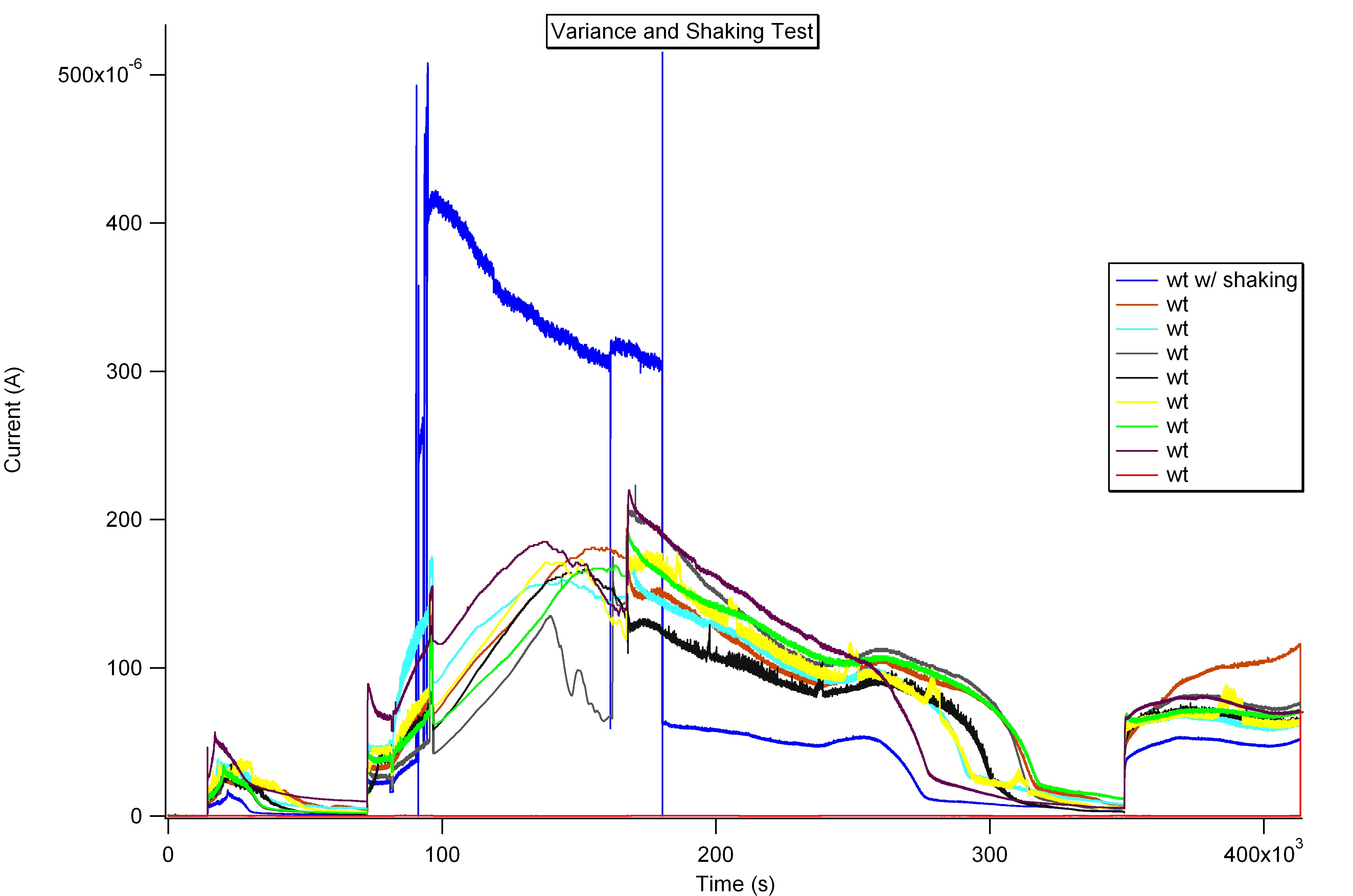Team:Harvard/Dailybook/Week6/Widgetry
From 2008.igem.org
(Difference between revisions)
(New page: =Goals for this week= =Monday: July 28, 2008= =Tuesday: July 29, 2008= =Wednesday: July 30, 2008= =Thursday: July 31, 2008= =Friday: August 1, 2008=) |
Linchinlee (Talk | contribs) (→First Nine-chamber Test) |
||
| (16 intermediate revisions not shown) | |||
| Line 1: | Line 1: | ||
=Goals for this week= | =Goals for this week= | ||
| - | + | * Finish building remainder of chambers to bring us up to a total of 9 working fuel cells | |
| - | = | + | * Configure Kiethley/LabVIEW to support measurement from 9 fuel cells |
| - | + | * Run test with 9 identical wt chambers to test for reproducibility of results | |
| - | + | ** Use argon instead of nitrogen on anode side | |
| - | + | ||
| + | =First Nine-chamber Test= | ||
| + | * Clean and re-build fuel cells in preparation for experiment | ||
| + | ** Reused cathodes, but replaced Nafion membrane and anode | ||
| + | * Placed built fuel cells under UV light to prevent contamination | ||
| + | |||
| + | [[Image:shaking.jpg | 600px]] | ||
| + | |||
| + | '''Variance Test with Shaking''' | ||
| + | |||
| + | |||
| + | What we did: | ||
| + | |||
| + | -Tested how much variance existed among chambers by running 9 parallel chambers with wt Shewie | ||
| + | |||
| + | -Switched nitrogen gas with argon gas on the anode side | ||
| + | |||
| + | -Shook chamber 1 manually to see the effect of shaking on current production | ||
| + | |||
| + | |||
| + | Results: | ||
| + | |||
| + | -Current production range was between 50-75 microAmps | ||
| + | |||
| + | -Red line (wt w/ shaking) went up to 500 microAmps when shaking vigorously | ||
| + | |||
| + | :-Shows that shaking directly affects current production | ||
| + | |||
| + | :-Therefore, amount of gas bubbling directly affects current production | ||
| + | |||
| + | - Possible to use this as direct test for computer interface | ||
Latest revision as of 21:22, 29 October 2008
Goals for this week
- Finish building remainder of chambers to bring us up to a total of 9 working fuel cells
- Configure Kiethley/LabVIEW to support measurement from 9 fuel cells
- Run test with 9 identical wt chambers to test for reproducibility of results
- Use argon instead of nitrogen on anode side
First Nine-chamber Test
- Clean and re-build fuel cells in preparation for experiment
- Reused cathodes, but replaced Nafion membrane and anode
- Placed built fuel cells under UV light to prevent contamination
Variance Test with Shaking
What we did:
-Tested how much variance existed among chambers by running 9 parallel chambers with wt Shewie
-Switched nitrogen gas with argon gas on the anode side
-Shook chamber 1 manually to see the effect of shaking on current production
Results:
-Current production range was between 50-75 microAmps
-Red line (wt w/ shaking) went up to 500 microAmps when shaking vigorously
- -Shows that shaking directly affects current production
- -Therefore, amount of gas bubbling directly affects current production
- Possible to use this as direct test for computer interface
 "
"
